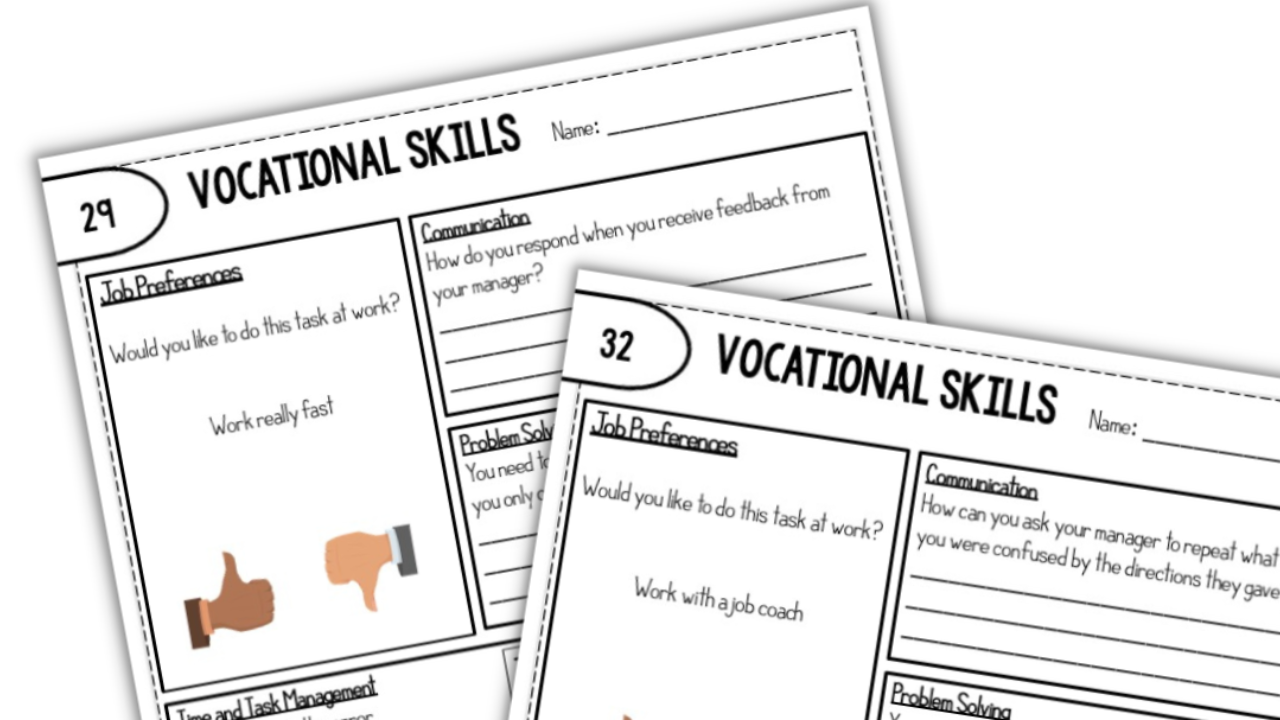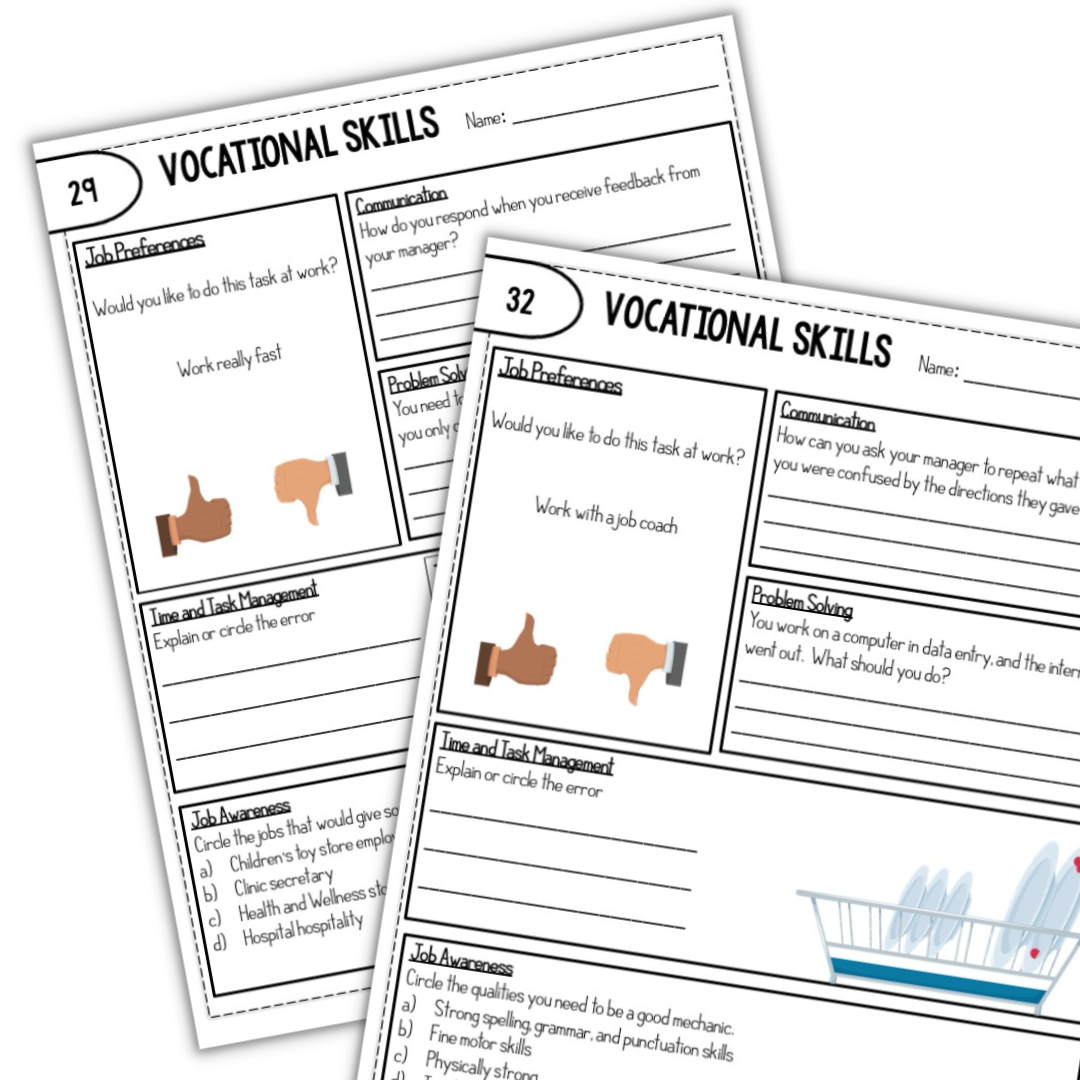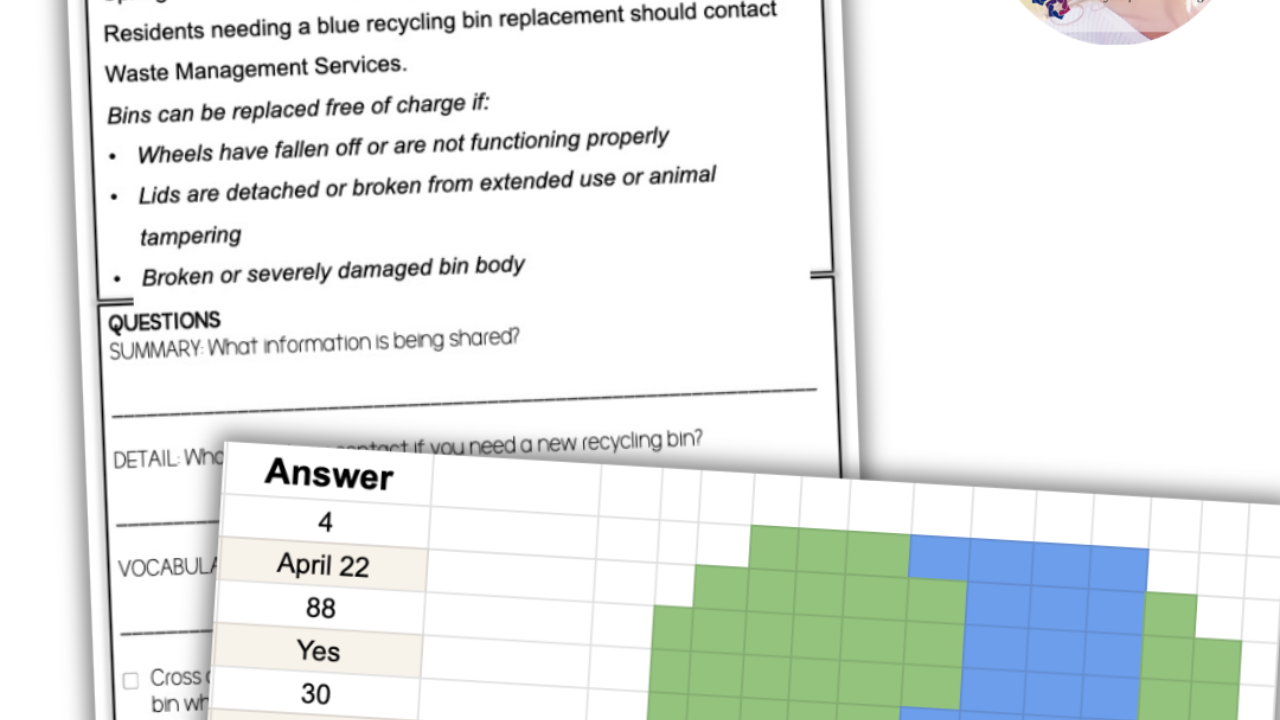Vocational Skills Worksheets for Special Education Students
Mar 06, 2023
As a transition teacher, I love routine when it comes to lesson plans (and I know most special education teachers do). I love having to think only 1 time and just automate from there. It frees up my brain and allows my students to know what to expect and when, which we all know is helpful on multiple levels.
Well, I’ve been expanding my ‘weekly’ amazing resources (beyond this stellar daily life skills resource) to include a full week of worksheets with non-repeating questions. A breakdown of potential full week lesson worksheets now includes functional reading, transition skills, safety skills, IEP transition plan, and now… vocational skills! Grab a free page from the Vocational Skills Weekly Worksheet to try for yourself!)
The Vocational Skills Weekly Worksheet is the newest weekly-use resource and it’s something I definitely wish I had a few years ago! I would have used it at the start of each week to gather a baseline for future lessons. It also would have given me something to write other than ‘Create Resume’ for the umpteenth time on the scope and sequence!
Let me back-up a bit and review vocational skills and how they weave into special education services in general.
What are Vocational Skills?
In terms of special education, vocation = job, so vocational skills are job skills or work skills. The skills needed to complete work tasks and to maintain a positive working relationship with coworkers, managers, and customers are vocational skills. These vocational skills encompass the 'both and,' meaning both the essential skills to complete a specific task and the skills to interact with other people. Vocational skills apply to students pursuing both volunteer positions and competitive employment.
Vocational skills are specific skills that help students achieve their Training and Employment dreams (aka the long or short-term career goals described in the IEP transition plan) because many students have long-term career goals, such as working with children or animals, helping senior citizens, or making jewelry.
An overarching important life skill for students is to identify the best volunteer or career path for them based on their strengths. While finding a good fit may include a career change from one field or position to another, for example, working in the back room of a clothing boutique processing clothes to working alongside customers in the sales or checkout process, exposure to a variety of vocational settings and employment opportunities can help students to learn about their strengths and natural skill sets.
While job interview skills and researching potential employers are good starting points for vocational skills, especially for middle school and early high school students, there are other vocational skills to address.
Below are some specific examples of vocational IEP goals that may be helpful as you and the IEP team set goals and write transition plans. Writing meaningful goals take into account the students' needs, their long-term goals (aka their interests), and their strengths and vocational-specific goals should be no different. Keep in mind when goal setting to write SMART goals, which I share more about in my IEP Goal Bank : Transition Skills blog post.
5 Potential Vocational Goal Ideas:
- Task Initiation- Reference task lists and begin the next task on the list immediately after completing the prior task, either independently or with minimal or assistive prompting.
- Workplace Safety- Identify safety risks in the work setting, consider safe alternatives, and execute best/most safe plan. For example, a safety risk may be walking on a wet restaurant floor that was just mopped when an employee needs to restock the drink area. A few safe alternatives would be to purchase anti-slip shoes, to fill the drink area before their coworker mops, or to wait until the floor dries before filling the drink area.
- Personal Development- Includes skills outside the workplace to maintain employment, such as utilizing public transportation to get to and from work on time, communicating scheduling preferences for days off, changes to schedule, and sick days, and requesting assistive technology or reasonable accommodations to meet physical or sensory needs to create the most optimal work environment.
- Professional Appearance/Professional Life- Complete the steps for personal hygiene and/or wear the clothing or uniform as expected by management for safety or business representation (for example, a business may expect all employees to wear a red shirt and closed toe shoes to be easily identified by customers and for the safety of the staff person).
- Prioritization- Review steps to complete a single task or multiple tasks and identify the best next steps to meet the short-term goals of completing assigned work by a specific time.
Looking for pre-vocational skills ideas? Read my list of 125 pre-vocational skills!
I would be remiss if I didn't make clear the two main categories of vocational skills: Soft skills and Hard skills. For true career preparedness, future employees should be trained in both skill areas.
Soft Skills:
Soft skills are the critical thinking and communication skills needed to perform nearly any job. For example, soft skills include knowing the best way to complete household chores (i.e., dust the shelves first, then sweep the floor).
Soft skills are an important skill set, no matter the type of work. Per research, soft skills are 85% of a job, which directly impact whether they have a successful career in their particular field. The most important soft skills include social skills (i.e. communication), task and time management skills, attitude, and critical thinking.
This type of job training can be covered in special education classrooms as high school students and young adults in transition do not need to be at community-based job sites to address these skill areas (although a community context can be very helpful for many).
Hard Skills:
Hard skills are the detailed, task-specific knowledge or skills to perform a specific job. For example, the hard skill is knowing how to hold the duster, which spray to use to clean the window, how to wipe a whole glass shelf, and then the best approach to sweeping and how to hold the dust pan.
Other examples of hard skills include the complex task of packing grocery bags as a bagger, how to retrieve, convert, and enter specific data into a system, or .
Also, as a worker grows in their career - hard skills may include learning a new skill that will qualify them for a different role or higher paying position.
As mentioned above, mastering hard or technical skills is only 15% of a job. Not to be undercut by soft skills, hard skills are very important. They help qualify an individual for a position and can help them maintain it and qualify for better jobs.
Students interested in entering the job market to find competitive employment can increase their hard skills through formal training, education, entry-level job experiences, apprenticeships, and certifications. Typical vocational training, career technical education courses, and vocational centers aim to address the hard skills of a work task in their adult education programs.
Now, you are probably asking yourself, 'How can I address all these important vocational skills in my classroom without prepping for hours?' Well, the answer is the Vocational Skills Worksheet Workbook!
The best parts of the Vocational Skills Weekly Worksheet resource:
Meaningful Vocational Skills Practice in the Classroom Setting
We know the value of practicing vocational skills in a vocational setting. We also know the classroom is not a traditional vocational setting. Unfortunately, there are times when you need to introduce or review vocational skills in the functional skills classroom. The Vocational Skills Weekly Worksheets are a great way to do just that! Whether your students are bound to the classroom vocational setting for whatever reason (and if they are, check out this list of 4 Small Business Ideas for Students with High Support Needs) or whether they spend time in the community, this resource will give them meaningful practice in key vocational skill areas.
This resource is not your average workbook of worksheets; it's a way to practice vocational skills and prepare for those exciting first jobs. The best way to address the skills will be used in both work and independent living settings from the convenience of a desk chair.
While these PDF worksheets can be completed by a whole class during a morning warm-up, it can also be part of an independent work packet for those early finishers or during remote or distance learning, or as a table stop during independent work stations to complement other student activities, like a sorting activity and resume update.
With Problem-Solving, Communication, Prioritization, and Time Management as key question categories covered in these worksheets, it's the perfect way to introduce and review real world scenarios students will likely encounter before they enter the community-based work setting.
A Variety of 6 Vocational Questions Per Page
Each printable PDF activity page has 6 questions (noticing the pattern of the routine again) in clear outlined boxes. I love the similar format of the boxes because you can have students complete the whole worksheet on their own OR work through each box one at a time because the boxes are clearly marked. The following are the specific skills covered in each worksheet.
The 6 vocational skills addressed on each page include:
-
Job Preferences (Ex- would you like to do a job with this type of task?)
-
Problem-solving (Ex- How would you handle this hypothetical situation?)
-
Communication (Ex- How would you communicate this information with a customer/coworker/manager?)
-
Prioritizing (Ex- What task should you do first?)
-
Time Management and Task Management (Ex- Find the task accuracy error in this picture)
-
Job Awareness (Ex- What skills and strengths are needed for a specific job?)
While routine is great, the variety and non-repeating questions covering different skills make this a fun way to organically bring up high-frequency skills and scenarios for individual or class discussion. The six checkpoint questions do the hard thinking for you!
Appropriate For Students With and Without Vocational Experience
Each page is highly visual, has clear and easy-to-understand language for low-level readers, and has just enough variety to keep it from getting boring when used weekly.
You might think that this resource would be best to use with students who have vocational experience, whether it’s in the community as a part time job or an in-school volunteer gig. However, you can use this resource as an introduction into vocational skills. If you teach middle school or freshman and sophomores who are just starting to consider careers and show interest in vocational education and employment, then this resource would definitely be appropriate for them.
Created for vocational exposure, this resource is appropriate for different levels, specifically transition age through middle school and high school 7-12 - worksheet based activities. With a variety of 36 worksheets to choose from, this resource could serve as one of the functional activities for a career unit.
If you are looking for community-based vocational site ideas, here is a list of Over 30 Community Vocational Student Volunteer Sites Ideas to check out. You would actually be helping to set them up for future success with all the real-life examples in this resource- well done!
Print and Done!
This is a great printable activity resource to print 1 time and be set for the whole school year! No other prep is needed, and it can be used in a variety of ways. You could give each student 1 page each week or print as a workbook and have students work page by page for an entire week in a binder. The pages are labeled with numbers at the top, to help keep you (and them) organized! If it were me, and you know I love routine, I would sit at that printer for a few minutes, get everything printed for the whole year, binder clip the same pages together, and stack everything in the classroom.
And, answer keys are included. Boom, you are set!
Other Essential Life Skills Lessons
If you want other functional and basic skills to round out a vocational unit, check out the Personal Hygiene lesson bundle and Phone Call Activity and Games resource!
If your brain is saying, ‘Yes, please I need this resource for my students (and my sanity)!’ then grab the Vocational Skills Weekly Worksheets today!





















